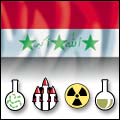 |
|
 |
|
 |
 |
 |
 |
 |
 |
 |
 |
 |
 |
| 2016 Election: | Hillary's book | Trump's book | Bernie's book | Ted Cruz's book | | | 2016 Senate Debates |
Iraq Survey Group report on Saddam Hussein's weapons of mass destruction, October 2004 
The ISG Interim Progress Report is available in PDF format. The Iraq STUDY Group is a 2006 report, two years after the Iraq SURVEY Group report. Click here for excerpts from the Iraq Study Group report.
In addition to details of dormant WMD programs, the October 2003 report also includes discoveries of non-WMD programs banned by the United Nations and concealed during the IAEA and UNMOVIC inspections that began in 2002. The discoveries made by the ISG include a "clandestine network of laboratories [...] that contained equipment [...] suitable for continuing chemical biological weapons research" and vials of "live C botulinum Okra B from which a biological agent can be produced". (http://www.cia.gov/cia/public_affairs/speeches/2003/david_kay_10022003.html). Lines of enquiry adopted by the ISG include the examination of sites across Iraq, as well as interviewing scientists, truck drivers and other workers with possible knowledge of WMD. The failure to find any stockpiles of chemical, biological or nuclear weapons has proved a problem for Washington and London, who used intelligence indicating that Iraq did possess WMD as one of the primary justifications for the invasion of Iraq. The British government, in particular, placed very heavy emphasis on this intelligence. On January 23, 2004, the head of the ISG, David Kay, resigned his position, stating that he believed WMD would not be found in Iraq. "I don't think they existed," commented Dr. Kay. "What everyone was talking about is stockpiles produced after the end of the last Gulf War and I don't think there was a large-scale production programme in the 90s." Kay criticised the intelligence that led to the war in testimony to the Senate Armed Services Committee, saying "we were all wrong and that is most disturbing".Kay's successor, named by CIA director George Tenet, is the former UN weapons inspector Charles Duelfer. Duelfer has stated that the chances of finding any WMD in Iraq are "close to nil". The Iraq Survey Group continued the work of UN inspectors, led by Hans Blix and Mohamed ElBaradei, who were mandated by the UN Security Council to search for illegal weapons before the conflict. The replacement of UNMOVIC/IAEA with British and American scientists was consistent with general trends in the country, which saw the influence of United Nations wane in favour of the occupying military forces. After the capture of Saddam Hussein, Hans Blix played down suggestions that the former dictator would reveal the wherabouts of any illegal weapons stockpiles: "I doubt that he will reveal any WMD, because I think both we UN inspectors and the American inspectors have been looking around and come to the conclusion that there aren't any," Mr Blix said. "He might be able to reveal when they were done away with. I am inclined to think it was early in 1991 or 1992." On February 1, 2004, senior US administration officials announced that President Bush is to convene an independent enquiry into the intelligence used to justify the Iraq war and the failure to find weapons of mass destruction. This was shortly followed by the convention of a similar enquiry in the UK, which has been boycotted by the two main opposition parties due to disagreements on its scope and independence (http://news.bbc.co.uk/1/hi/world/middle_east/3426931.stm). The US-sponsored search for WMD has so far cost $300 million, with the final bill expected to top $1 billion.
| ||||||||||||||||||||||||||||||||||||||
| ||||||||||||||||||||||||||||||||||||||
Page last edited: Dec 22, 2018